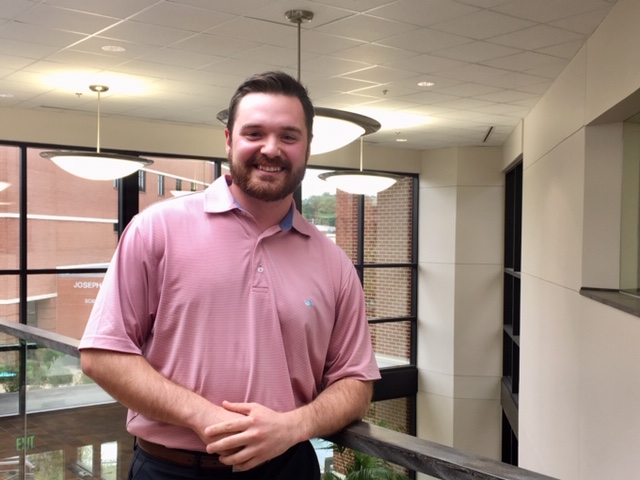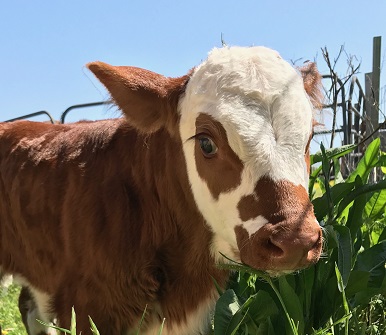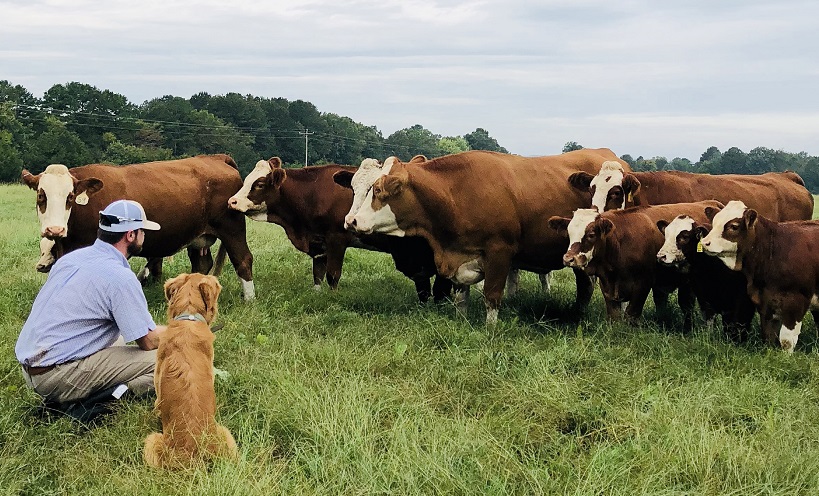This is the second in a series of
posts
about student entrepreneurs on the Harding campus.
When the
Waldron Center
got a tip that senior Mason Faulkner had to miss class because he “was headed to Canada to buy some cattle,” curiosity got the best of us. We discovered a young entrepreneur with 10 years of cattleman’s intuition and an accountant’s analytical predisposition. Discussing his herd of registered
Fleckvieh Simmentals
, he spoke with a quiet confidence that implied he's thought a great deal about how to invest his energies.
 Faulkner played scholarship baseball for two years at
Crowder College
in Neosho, Missouri. He pitched for the Bisons for a season before injuries derailed him from collegiate baseball. He pointed to some surgical scars on his elbow, resigned. “My baseball career’s pretty much over now.”
College was about much more than sports for Faulkner, whose major is accounting.
“I love numbers and the language of business, and I thought accounting would help transition me eventually into a career in farming. I knew the finance background would be helpful.”
His parents, Perry, a CPA, and Jalene, a retired math teacher, have a commercial herd of around 200 in Center Ridge, Arkansas. “When I was 12, my family sold me my first cow for $100. Ten years later I’m sitting on 15 head.”
Raising cattle requires money, land, skill
and relentless engagement. Commercial beef cattle, usually a cross between breeds with no pedigree, are raised to sell at market for slaughter. Purebred (registered) cattle, however, are raised either to produce breeding stock for other purebred producers or for breeding desirable traits into commercial herds. A registered herd requires more intense management than a commercial herd. The owner tracks performance metrics for each animal.
Faulkner’s business model is to run registered breeding stock; he’s curating a bloodline. He just returned from purchasing six Fleckvieh cows from Saskatchewan. Why Canada? “The original imports of the breed went there, so a lot of the original genetics are there. If I buy them there, I get different genetics, and it increases the value of my herd.” Faulkner’s cattle are isolated in their own pasture on family land in Center Ridge, and he manages his herd separately.
Faulkner played scholarship baseball for two years at
Crowder College
in Neosho, Missouri. He pitched for the Bisons for a season before injuries derailed him from collegiate baseball. He pointed to some surgical scars on his elbow, resigned. “My baseball career’s pretty much over now.”
College was about much more than sports for Faulkner, whose major is accounting.
“I love numbers and the language of business, and I thought accounting would help transition me eventually into a career in farming. I knew the finance background would be helpful.”
His parents, Perry, a CPA, and Jalene, a retired math teacher, have a commercial herd of around 200 in Center Ridge, Arkansas. “When I was 12, my family sold me my first cow for $100. Ten years later I’m sitting on 15 head.”
Raising cattle requires money, land, skill
and relentless engagement. Commercial beef cattle, usually a cross between breeds with no pedigree, are raised to sell at market for slaughter. Purebred (registered) cattle, however, are raised either to produce breeding stock for other purebred producers or for breeding desirable traits into commercial herds. A registered herd requires more intense management than a commercial herd. The owner tracks performance metrics for each animal.
Faulkner’s business model is to run registered breeding stock; he’s curating a bloodline. He just returned from purchasing six Fleckvieh cows from Saskatchewan. Why Canada? “The original imports of the breed went there, so a lot of the original genetics are there. If I buy them there, I get different genetics, and it increases the value of my herd.” Faulkner’s cattle are isolated in their own pasture on family land in Center Ridge, and he manages his herd separately.
 “I like the breed because they are heartier, are bigger, have more longevity and bring more when you sell them per pound.” A little research reveals Fleckvieh are also known for “fitness characteristics including fertility, calving ease, udder health, milking speed, somatic cell count and persistence.” There’s a lot to know.
“I don’t sell mine at a local market barn. I’ll be taking them to a big registered cattle sale in Texas this weekend, and later on I’ll consign some at a registered sale in Mississippi. The full bloods bring more money there. I raise bulls to sell to Angus or Brangus breeders who cross the bulls with the Angus cows. The genetics of the Simmental improves their commercial herd.”
Faulkner navigates a conversation about advanced reproduction technologies in cattle with businesslike instruction; he's aware that the vast majority of people he sees day-to-day have no idea what he’s up to. Occasionally, he’d quietly correct something to make sure we understood. Assisted reproductive interventions can be costly. To save money, a cattleman must develop some veterinary expertise. “Mom’s a pretty good vet, and we inseminate our cows ourselves,” he said.
He’s looking ahead. “I graduate in May, sit for the CPA exam and will start work for
HoganTaylor
, a regional public accounting firm. I’ll start out living at home in Center Ridge.” He needs to stay close to the herd. “And I’m looking at some land in Perry County that may become available eventually.”
So what’s his endgame? “All my life, I’ve been competitive, playing sports. I like to use my strengths to go out and meet people. I’ve built up this network of other farmers and I’d like to get some public accounting experience and eventually perhaps specialize in agriculture.” He wants to contribute to improving the industry. “Agriculture is very important; it’s a big part of everyone's lives. I feel there’s a need for publicity to help people understand what we do and how to make it more sustainable. Technology is advancing, and we need to find ways to incorporate it.”
“I like the breed because they are heartier, are bigger, have more longevity and bring more when you sell them per pound.” A little research reveals Fleckvieh are also known for “fitness characteristics including fertility, calving ease, udder health, milking speed, somatic cell count and persistence.” There’s a lot to know.
“I don’t sell mine at a local market barn. I’ll be taking them to a big registered cattle sale in Texas this weekend, and later on I’ll consign some at a registered sale in Mississippi. The full bloods bring more money there. I raise bulls to sell to Angus or Brangus breeders who cross the bulls with the Angus cows. The genetics of the Simmental improves their commercial herd.”
Faulkner navigates a conversation about advanced reproduction technologies in cattle with businesslike instruction; he's aware that the vast majority of people he sees day-to-day have no idea what he’s up to. Occasionally, he’d quietly correct something to make sure we understood. Assisted reproductive interventions can be costly. To save money, a cattleman must develop some veterinary expertise. “Mom’s a pretty good vet, and we inseminate our cows ourselves,” he said.
He’s looking ahead. “I graduate in May, sit for the CPA exam and will start work for
HoganTaylor
, a regional public accounting firm. I’ll start out living at home in Center Ridge.” He needs to stay close to the herd. “And I’m looking at some land in Perry County that may become available eventually.”
So what’s his endgame? “All my life, I’ve been competitive, playing sports. I like to use my strengths to go out and meet people. I’ve built up this network of other farmers and I’d like to get some public accounting experience and eventually perhaps specialize in agriculture.” He wants to contribute to improving the industry. “Agriculture is very important; it’s a big part of everyone's lives. I feel there’s a need for publicity to help people understand what we do and how to make it more sustainable. Technology is advancing, and we need to find ways to incorporate it.”
 He’s got an eye for innovation. “I’ve been on a mission the last year to create an app to track data on cattle: breedings, weanings, weights, heat cycles, dates, prices, accounting — so when I am out in a pasture with a client who says, ‘What about number 53 out there — tell me about her?’ I’ll have all the data available for each animal.” He and his uncle, a programmer, are already testing the app. Are they looking to market it? “It’s an ongoing project. The biggest challenge is that farmers may not be very tech savvy. Some will dabble with it and then abandon it. It didn’t cost us anything, and I can use it if it never comes to anything commercial.”
What qualities does he think are especially important for a cattleman? “A cattleman typically only generates revenue twice a year, but expenses come in every month. So you have to manage your money. A cattleman has to be good with cash flow.”
With 10 years of experience building his own herd and his accounting credential in hand, we expect Faulkner is well-positioned to handle what’s ahead.
If you're a Harding student running a business, the Waldron Center would like to connect with you. Email Patti Summers psummers@harding.edu. Follow us on Instagram or Twitter @huwaldroncenter.
He’s got an eye for innovation. “I’ve been on a mission the last year to create an app to track data on cattle: breedings, weanings, weights, heat cycles, dates, prices, accounting — so when I am out in a pasture with a client who says, ‘What about number 53 out there — tell me about her?’ I’ll have all the data available for each animal.” He and his uncle, a programmer, are already testing the app. Are they looking to market it? “It’s an ongoing project. The biggest challenge is that farmers may not be very tech savvy. Some will dabble with it and then abandon it. It didn’t cost us anything, and I can use it if it never comes to anything commercial.”
What qualities does he think are especially important for a cattleman? “A cattleman typically only generates revenue twice a year, but expenses come in every month. So you have to manage your money. A cattleman has to be good with cash flow.”
With 10 years of experience building his own herd and his accounting credential in hand, we expect Faulkner is well-positioned to handle what’s ahead.
If you're a Harding student running a business, the Waldron Center would like to connect with you. Email Patti Summers psummers@harding.edu. Follow us on Instagram or Twitter @huwaldroncenter.